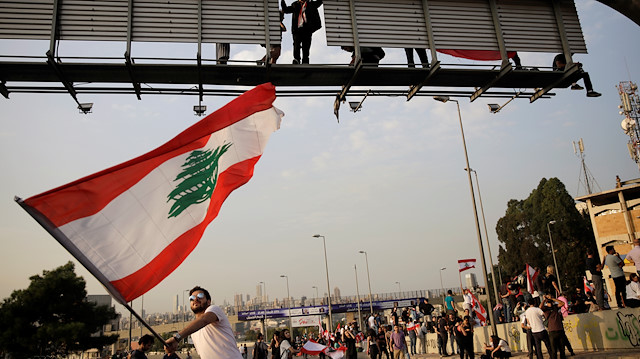
"WE ARE ALL IN DEEP TROUBLE"
Nearby, a dozen or so protesters chanting "revolution, revolution" toured the centre of the capital urging shops to close to pressure leaders to agree reforms to tackle poverty, rising unemployment and worsening living standards.
Hani Bohsali, general manager of Bohsali Foods and president of the Syndicate of Importers of Foodstuffs, Consumer Products and Drinks, which represents around 50 importers, said he was among businessmen who had warned of more trouble at a meeting with Central Bank governor Riad Salameh and other top bankers.
"My message to all of them is that we are all in deep trouble, but you have to give priority to the food supply. Because the food is even more important than the fuel," he said.
Banks, which were shut for half of October, closed again this week over staff security concerns. Most transfers out of the country have been blocked and, with U.S. dollars scarce, the pegged Lebanese pound is weakening on a black market.
"You have a problem of liquidity, and there is no solution for it, unless you put in place a proper plan to solve the problem, there is no need to open the banks," a banker said.
By staying closed, the banks were avoiding the bigger problem of panic among depositors, the banker said.
"You need to have a political solution, to offer a little bit of confidence, and this will eventually allow you to calm down the market and reopen normally," he said.
Lebanon's bank staff union called on Thursday for employees to stay on strike until it received details of a security plan, especially on how to deal with customers demanding their cash.
The Lebanese pound was little changed on the black market. Dollars were being offered at 1,850 pounds compared to 1,820 on Tuesday, an exchange dealer said, around 23% weaker than the official rate of 1,507.5 pounds. The weakening pound has led some shops to hike prices of imported goods in Lebanese pounds.
The protester killed on Tuesday was a follower of Walid Jumblatt, a veteran Druze politician and former civil war militia leader, who has urged his supporters to remain calm.
Taymour Jumblatt, Jumblatt's son and political heir, called for protests to remain peaceful.
Hello, the comments you share on our site are a valuable resource for other users. Please respect other users and different opinions. Do not use rude, offensive, derogatory, or discriminatory language.
The floor is all yours.








